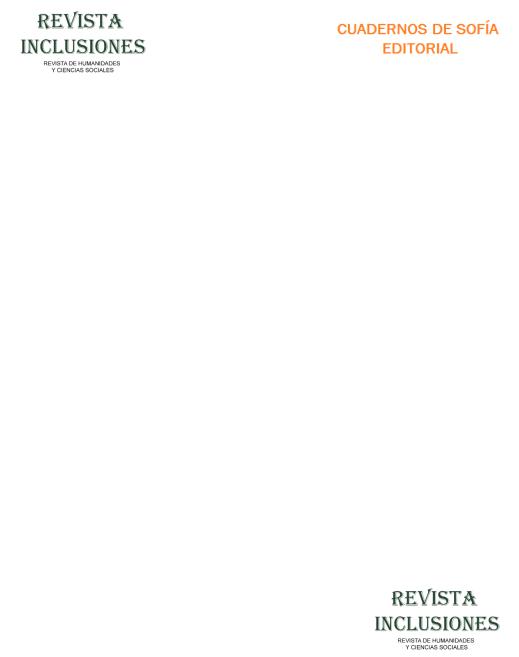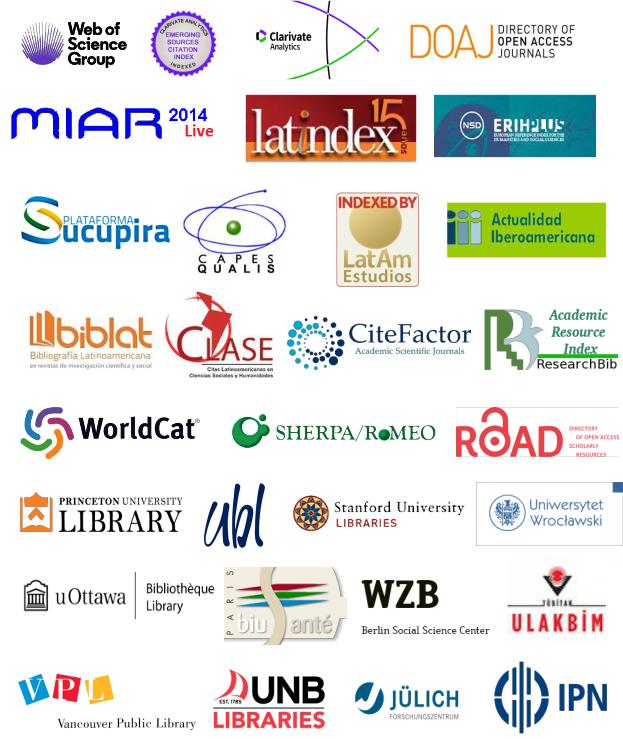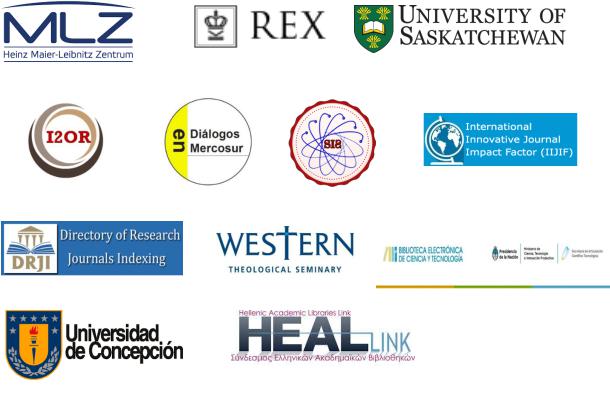
Статья Равочкин, Король, Луневы, Монгуш, Рахинский
.pdf

CUERPO DIRECTIVO
Directores
Dr. Juan Guillermo Mansilla Sepúlveda
Universidad Católica de Temuco, Chile
Dr. Francisco Ganga Contreras
Universidad de Tarapacá, Chile
Editor
Drdo. Juan Guillermo Estay Sepúlveda
Editorial Cuadernos de Sofía, Chile
Editor Científico
Dr. Luiz Alberto David Araujo
Pontificia Universidade Católica de Sao Paulo, Brasil
Editor Europa del Este
Dr. Aleksandar Ivanov Katrandzhiev
Universidad Suroeste "Neofit Rilski", Bulgaria
Cuerpo Asistente
Traductora: Inglés
Lic. Pauline Corthorn Escudero
Editorial Cuadernos de Sofía, Chile
Portada
Lic. Graciela Pantigoso de Los Santos
Editorial Cuadernos de Sofía, Chile
COMITÉ EDITORIAL
Dr. Jaime Bassa Mercado
Universidad de Valparaíso, Chile
Dra. Heloísa Bellotto
Universidad de Sao Paulo, Brasil
Dra. Nidia Burgos
Universidad Nacional del Sur, Argentina
Mg. María Eugenia Campos
Universidad Nacional Autónoma de México, México
Dr. Francisco José Francisco Carrera
Universidad de Valladolid, España
Dr. Pablo Guadarrama González
Universidad Central de Las Villas, Cuba
Mg. Amelia Herrera Lavanchy
Universidad de La Serena, Chile
Dr. Claudio Llanos Reyes
Pontificia Universidad Católica de Valparaíso, Chile
Dr. Werner Mackenbach
Universidad de Potsdam, Alemania
Universidad de Costa Rica, Costa Rica
Mg. Rocío del Pilar Martínez Marín
Universidad de Santander, Colombia
Ph. D. Natalia Milanesio
Universidad de Houston, Estados Unidos
Ph. D. Maritza Montero
Universidad Central de Venezuela, Venezuela
Dra. Eleonora Pencheva
Universidad Suroeste Neofit Rilski, Bulgaria
Dra. Rosa María Regueiro Ferreira
Universidad de La Coruña, España
Dr. Andrés Saavedra Barahona
Universidad San Clemente de Ojrid de Sofía, Bulgaria
Dr. Efraín Sánchez Cabra
Academia Colombiana de Historia, Colombia
Dra. Mirka Seitz
Universidad del Salvador, Argentina
Ph. D. Stefan Todorov Kapralov
South West University, Bulgaria
COMITÉ CIENTÍFICO INTERNACIONAL
Comité Científico Internacional de Honor
Dr. Adolfo A. Abadía
Universidad ICESI, Colombia
Dr. Carlos Antonio Aguirre Rojas
Universidad Nacional Autónoma de México, México
Dr. Martino Contu
Universidad de Sassari, Italia
Dr. Luiz Alberto David Araujo
Pontificia Universidad Católica de Sao Paulo, Brasil
Dra. Patricia Brogna
Universidad Nacional Autónoma de México, México

Dr. Horacio Capel Sáez
Universidad de Barcelona, España
Dr. Javier Carreón Guillén
Universidad Nacional Autónoma de México, México
Dr. Lancelot Cowie
Universidad West Indies, Trinidad y Tobago
Dra. Isabel Cruz Ovalle de Amenabar
Universidad de Los Andes, Chile
Dr. Rodolfo Cruz Vadillo
Universidad Popular Autónoma del Estado de Puebla, México
Dr. Adolfo Omar Cueto
Universidad Nacional de Cuyo, Argentina
Dr. Miguel Ángel de Marco
Universidad de Buenos Aires, Argentina
Dra. Emma de Ramón Acevedo
Universidad de Chile, Chile
Dr. Gerardo Echeita Sarrionandia
Universidad Autónoma de Madrid, España
Dr. Antonio Hermosa Andújar
Universidad de Sevilla, España
Dra. Patricia Galeana
Universidad Nacional Autónoma de México, México
Dra. Manuela Garau
Centro Studi Sea, Italia
Dr. Carlo Ginzburg Ginzburg
Scuola Normale Superiore de Pisa, Italia
Universidad de California Los Ángeles, Estados Unidos
Dr. Francisco Luis Girardo Gutiérrez
Instituto Tecnológico Metropolitano, Colombia
José Manuel González Freire
Universidad de Colima, México
Dra. Antonia Heredia Herrera
Universidad Internacional de Andalucía, España
Dr. Eduardo Gomes Onofre
Universidade Estadual da Paraíba, Brasil
+ Dr. Miguel León-Portilla
Universidad Nacional Autónoma de México, México
Dr. Miguel Ángel Mateo Saura
Instituto de Estudios Albacetenses “Don Juan Manuel”,
España
Dr. Carlos Tulio da Silva Medeiros
Diálogos em MERCOSUR, Brasil
+ Dr. Álvaro Márquez-Fernández
Universidad del Zulia, Venezuela
Dr. Oscar Ortega Arango
Universidad Autónoma de Yucatán, México
Dr. Antonio-Carlos Pereira Menaut
Universidad Santiago de Compostela, España
Dr. José Sergio Puig Espinosa
Dilemas Contemporáneos, México
Dra. Francesca Randazzo
Universidad Nacional Autónoma de Honduras, Honduras
Dra. Yolando Ricardo
Universidad de La Habana, Cuba
Dr. Manuel Alves da Rocha
Universidade Católica de Angola Angola
Mg. Arnaldo Rodríguez Espinoza
Universidad Estatal a Distancia, Costa Rica
Dr. Miguel Rojas Mix
Coordinador la Cumbre de Rectores Universidades Estatales América Latina y el Caribe
Dr. Luis Alberto Romero
CONICET / Universidad de Buenos Aires, Argentina
Dra. Maura de la Caridad Salabarría Roig
Dilemas Contemporáneos, México
Dr. Adalberto Santana Hernández
Universidad Nacional Autónoma de México, México
Dr. Juan Antonio Seda
Universidad de Buenos Aires, Argentina
Dr. Saulo Cesar Paulino e Silva
Universidad de Sao Paulo, Brasil

Dr. Miguel Ángel Verdugo Alonso
Universidad de Salamanca, España
Dr. Josep Vives Rego
Universidad de Barcelona, España
Dr. Eugenio Raúl Zaffaroni
Universidad de Buenos Aires, Argentina
Dra. Blanca Estela Zardel Jacobo
Universidad Nacional Autónoma de México, México
Comité Científico Internacional
Dra. Elian Araujo
Universidad de Mackenzie, Brasil
Mg. Rumyana Atanasova Popova
Universidad Suroeste Neofit Rilski, Bulgaria
Dra. Ana Bénard da Costa
Instituto Universitario de Lisboa, Portugal Centro de Estudios Africanos, Portugal
Dra. Noemí Brenta
Universidad de Buenos Aires, Argentina
Ph. D. Juan R. Coca
Universidad de Valladolid, España
Dr. Antonio Colomer Vialdel
Universidad Politécnica de Valencia, España
Dr. Christian Daniel Cwik
Universidad de Colonia, Alemania
Dr. Eric de Léséulec
INS HEA, Francia
Dr. Andrés Di Masso Tarditti
Universidad de Barcelona, España
Ph. D. Mauricio Dimant
Universidad Hebrea de Jerusalem, Israel
Dr. Jorge Enrique Elías Caro
Universidad de Magdalena, Colombia
Ph. D. Valentin Kitanov
Universidad Suroeste Neofit Rilski, Bulgaria
Mg. Luis Oporto Ordóñez
Universidad Mayor San Andrés, Bolivia
Dr. Gino Ríos Patio
Universidad de San Martín de Porres, Perú
Dra. María Laura Salinas
Universidad Nacional del Nordeste, Argentina
Dra. Jaqueline Vassallo
Universidad Nacional de Córdoba, Argentina
Dra. Maja Zawierzeniec
Universidad Wszechnica Polska, Polonia
Editorial Cuadernos de Sofía Santiago – Chile Representante Legal
Juan Guillermo Estay Sepúlveda Editorial

REVISTA INCLUSIONES ISSN 0719-4706 VOLUMEN 7 – NÚMERO ESPECIAL – JULIO/SEPTIEMBRE 2020
Indización, Repositorios y Bases de Datos Académicas
Revista Inclusiones, se encuentra indizada en:
CATÁLOGO
PH. D. (C) NIKITA NIKOLAEVICH RAVOCHKIN / PH. D. (C) VLADIMIR VIKTOROVICH LUNEV PH. D. NATALIA ALEXANDROVNA KOROL / PH. D. (C) TATYANA ANATOLYEVNA LUNEVA PH. D. (C) ALLA LOSPANOVNA MONGUSH / DR. DMITRY VLADIMIROVICH RAKHINSKIY

REVISTA INCLUSIONES ISSN 0719-4706 VOLUMEN 7 – NÚMERO ESPECIAL – JULIO/SEPTIEMBRE 2020
BIBLIOTECA UNIVERSIDAD DE CONCEPCIÓN
PH. D. (C) NIKITA NIKOLAEVICH RAVOCHKIN / PH. D. (C) VLADIMIR VIKTOROVICH LUNEV PH. D. NATALIA ALEXANDROVNA KOROL / PH. D. (C) TATYANA ANATOLYEVNA LUNEVA PH. D. (C) ALLA LOSPANOVNA MONGUSH / DR. DMITRY VLADIMIROVICH RAKHINSKIY

REVISTA INCLUSIONES ISSN 0719-4706 VOLUMEN 7 – NÚMERO ESPECIAL – JULIO/SEPTIEMBRE 2020
ISSN 0719-4706 - Volumen 7 / Número Especial / Julio – Septiembre 2020 pp.11-20
IDEOLOGICAL DETERMINATION OF SOCIAL TRANSFORMATIONS IN MODERN SOCIETY
Ph. D. (C) Nikita Nikolaevich Ravochkin
Kuzbass State Agricultural Academy, Russia
ORCID: 0000-0003-1247-8231
nickravochkin@mail.ru
Ph. D. (C) Vladimir Viktorovich Lunev
Siberian Federal University, Russia
ORCID: 0000-0002-8685-9611
vladimirl1@yandex.ru
Ph. D. Natalia Alexandrovna Korol
Siberian Federal University, Russia
ORCID ID 0000-0003-3695-743X
tascha-korol@yandex.ru
Ph. D. (C) Tatyana Anatolyevna Luneva
Reshetnev Siberian State University of Science and Technology, Russia
ORCID: 0000-0001-5681-3658
luneva@sibsau.ru
Ph. D. (C) Alla Lospanovna Mongush
Tuvan State University, Russia
ORCID: 0000-0002-1862-5370
alla-mongush@yandex.ru
Dr. Dmitriy Vladimirovich Rakhinskiy
Krasnoyarsk State Agrarian University, Russia
Prof. V.F. Voino-Yasenetsky Krasnoyarsk State Medical University, Russia
ORCID: 0000-0003-4971-7523
siridar@mail.ru
Fecha de Recepción: 22 de febrero de 2020 – Fecha Revisión: 11 de marzo de 2020
Fecha de Aceptación: 03 de junio de 2020 – Fecha de Publicación: 01 de julio de 2020
Abstract
The article deals with the specific nature of the ideological determination of social transformations at the current stage of global development. Ideas are defined as bases for the implementation of social changes. A connection is established between ideas, social imaginary and geographic localization of intellectual networks. Options for implementing social transformations are presented. The main options include modernization, revolution and coup. It is proved that the efficiency of performing regulative functions in society directly depends on the authorities and intellectuals' awareness of the state of the public life spheres within absolutely any state. The characteristic features of the mechanism of ideological determination are revealed. The process of the generation of ideas in the intellectual network is shown.
Keywords
Ideological determination – Global development – Modernization – Intellectual network
PH. D. (C) NIKITA NIKOLAEVICH RAVOCHKIN / PH. D. (C) VLADIMIR VIKTOROVICH LUNEV
PH. D. NATALIA ALEXANDROVNA KOROL / PH. D. (C) TATYANA ANATOLYEVNA LUNEVA
PH. D. (C) ALLA LOSPANOVNA MONGUSH / DR. DMITRY VLADIMIROVICH RAKHINSKIY

REVISTA INCLUSIONES ISSN 0719-4706 VOLUMEN 7 – NÚMERO ESPECIAL – JULIO/SEPTIEMBRE 2020
Ideological determination of social transformations in modern society pág. 12
Para Citar este Artículo:
Ravochkin, Nikita Nikolaevich; Lunev, Vladimir Viktorovich; Korol, Natalia Alexandrovna; Luneva, Tatyana Anatolyevna; Mongush, Alla Lospanovna y Rakhinskiy, Dmitriy Vladimirovich. Ideological determination of social transformations in modern society. Revista Inclusiones Vol: 7 num Especial (2020): 11-20.
Licencia Creative Commons Atributtion Nom-Comercial 3.0 Unported
(CC BY-NC 3.0)
Licencia Internacional
PH. D. (C) NIKITA NIKOLAEVICH RAVOCHKIN / PH. D. (C) VLADIMIR VIKTOROVICH LUNEV
PH. D. NATALIA ALEXANDROVNA KOROL / PH. D. (C) TATYANA ANATOLYEVNA LUNEVA
PH. D. (C) ALLA LOSPANOVNA MONGUSH / DR. DMITRY VLADIMIROVICH RAKHINSKIY

REVISTA INCLUSIONES ISSN 0719-4706 VOLUMEN 7 – NÚMERO ESPECIAL – JULIO/SEPTIEMBRE 2020
Ideological determination of social transformations in modern society pág. 13
Introduction
It may be useful to point out the abundance of instances of changes currently taking place in different societies. We also stress that the development of the majority of states, regardless of their belonging to a certain type in classification, is accompanied by multidimensional and complex transformations linked to numerous internal and external factors. In response to the challenges of modernity, authorities seek to develop the most efficient models and ways of social changes that foster the evolution of states. The options that facilitate social evolution allow one to identify the negative trends of its existence, as well as define the most prospective and substantiated ways for transformations.
The difference in the development of states and their social time depends on many factors, and the key factor is society's awareness of its processes. We believe that intellectual capital directly determines the successful development of a particular state. P.V. Kopnin believes that the idea was the highest result of the convergence of the thought and the object1. N.S. Rozov associates ideas with the "social imaginary" and a clear link to geographic localization of social networks and centers and notes that "it can happen in some areas of the Earth but not in others, and even if it happened, nobody would find out"2. We can see the developmental level of certain macroregions, which can be achieved merely by addressing the parameter of interest. Consequently, the realization of social networks reflects the intellectual state of society willing to meet the challenges of time and offer certain configurations of products of thought.
Therefore, the relevance of this work is determined by the urgency of the issue linked to studying the essence of ideational determination of social changes in modern society and connected to the applied nature of philosophy. The reasons that justify the validity of the choice of the study topic include the complexity of the structure of society, the unsustainability of its development, the risky nature and the presence of numerous internal and external conflicts. Essentially, these factors create the need for adapting social structures to the current situation with its historical, political, cultural and other parameters.
Methods
The methodological basis of the study is a synthetic framework that allows one to take into account the changes in the subject of the analysis. Besides general scientific methods and critical analysis, we used the provisions of comparative conceptual analysis, social realism, theoretical reconstruction, materialistic viewpoints, interdisciplinary and civilizational approaches.
Results
The analysis of academic literature indicates that the essence of social phenomena is significant for descriptions, evaluations and forecasts in terms of the set of features that reflect the content of the fundamental transformations carried out within social systems. Every society carries out its transformation into a new quality to achieve the desired model
1P.V. Kopnin, Dialektika kak logika i teoriya poznaniya (Moscow: Nauka, 1973).
2N.S. Rozov, Idei i intellektualy v potoke istorii: makrosociologiya filosofii, nauki i obrazovaniya (Novosibirsk: Manuscript, 2016).
PH. D. (C) NIKITA NIKOLAEVICH RAVOCHKIN / PH. D. (C) VLADIMIR VIKTOROVICH LUNEV
PH. D. NATALIA ALEXANDROVNA KOROL / PH. D. (C) TATYANA ANATOLYEVNA LUNEVA
PH. D. (C) ALLA LOSPANOVNA MONGUSH / DR. DMITRY VLADIMIROVICH RAKHINSKIY

REVISTA INCLUSIONES ISSN 0719-4706 VOLUMEN 7 – NÚMERO ESPECIAL – JULIO/SEPTIEMBRE 2020
Ideological determination of social transformations in modern society pág. 14
of development3. By the way, one can equate the meaning of the notions "social changes" and "social transformations". We believe this to be necessary for the content analysis of the processes described in this work.
In the most general sense, the term “social transformation” has the following meaning, “the intended and elaborated measure of necessary changes, within which there is a selection of the most significant and promising, an adaptation of society to the changes through the development of programs, projects, goals, technologies and the resolution of contradictions”4. Such a definition of the essence of social transformations allows one to see two significant aspects. First, the indication that some characteristics of the current social system are not efficient or useful for the solution of specific problems faced by society as a system. Second, this refers to a combination of desired characteristics of that society that allow one to overcome the presented challenges. Therefore, social transformations in the evolutionary aspect as a form of societal evolution from a less developed to a more developed state. Philosophical analysis of the features of social changes makes it possible to reflect the social and historical development of society. It makes sense that the social and philosophical study should be based on evolutionary and functional principles. According to the former, the progress of society is achieved through complementing and developing the features of the social system that are necessary during a particular historical period. The essence of the functional principle can be seen in the ongoing changes that affect not only the substance of the social system as a whole but also its particular individual areas. Moreover, the first step is the optimization of ideas that determine the changes. The correction of social ideas that any transformations are based on affects their essence. With the engineering approach, the work on ideas eliminates the surplus of resources used, resolves the contradictions between subjects and coordinates their operating principles and prioritizes changes in the areas of social life, thus integrating the logic of material things with the subjective nature of individuals5.
Let us present an example with a concept of a post-industrial society by D. Bell6 in which the scholar notes that there are four grounds for social changes:
1.The technical and economic sphere the central thesis of which is the law of efficiency (in the work of facilities and economic relations and their interaction);
2.The Marxist nature of property relations used to describe the transition from a pre-industrial to a post-industrial society;
3.The axis of the political and cultural development which are no longer considered elements of the superstructure7.
3 S. A. Zubenko, “Transformaciya socialno-ekonomicheskih sistem: tendencii i factory”, Vestnik
Tambovskogo universiteta. Seriya: Gumanitarnye nauki Vol: 3 num 71 (2009): 303-308.
4V. Y. Shapovalov, “Rol socialnyh transformacij v processe razvitiya obshchestva”, Teoriya i praktika obshchestvennogo razvitiya num 4 (2010): 9-12.
5K. R. Popper, The Open Society and Its Enemies (Princeton: Princeton University Press, 2013).
6D. Bell, The coming of post-industrial society: A venture in social forecasting (New York: Basic books, Cop, 1973).
7D. Bell, The coming of post-industrial society: A venture in social forecasting (New York: Basic books, Cop, 1973).
PH. D. (C) NIKITA NIKOLAEVICH RAVOCHKIN / PH. D. (C) VLADIMIR VIKTOROVICH LUNEV
PH. D. NATALIA ALEXANDROVNA KOROL / PH. D. (C) TATYANA ANATOLYEVNA LUNEVA
PH. D. (C) ALLA LOSPANOVNA MONGUSH / DR. DMITRY VLADIMIROVICH RAKHINSKIY
